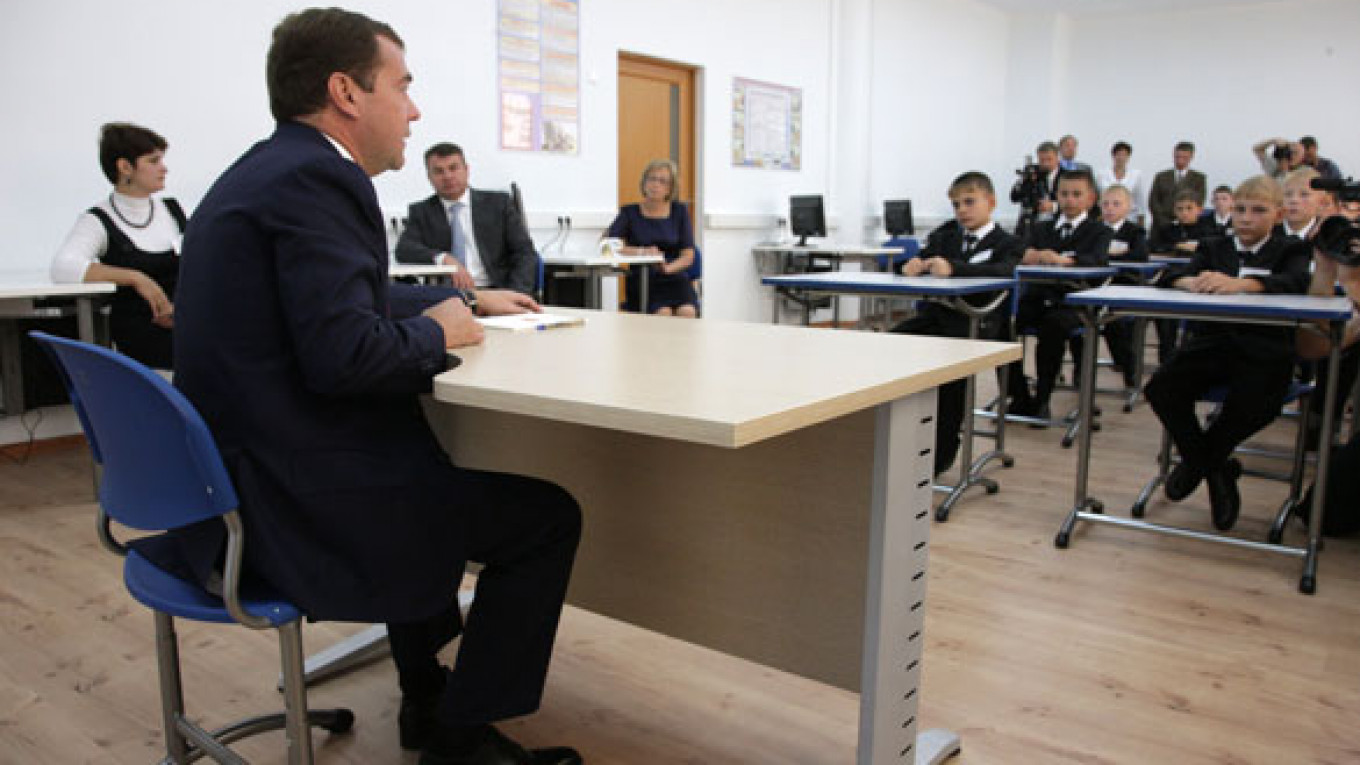When President Dmitry Medvedev arrives in Azerbaijan for a two-day visit Thursday in yet another bid to strengthen the Kremlin’s influence in the South Caucasus, he will face all the unsolved problems that have troubled the region since the Soviet breakup.
The seemingly intractable Nagorno-Karabakh conflict resurfaced this week when Armenia and Azerbaijan traded accusations over a deadly clash on the rebel region’s cease-fire line.
Azerbaijan said two of its soldiers and three Armenians were killed when Azeri forces repelled an attack Tuesday from the unrecognized republic controlled by Armenian separatists. The Armenian side claimed an Azeri assault in which one of its soldiers was injured while the attackers suffered unspecified losses. This was the second bloody incident this summer. In June, four Armenian soldiers and one Azeri died in what analysts believe was an Azeri attack.
Medvedev might also face criticism for signing a controversial protocol with Armenia earlier this month.
The protocol, which extends the lease for Russia’s military base in the Armenian town of Gyumri until 2044, says Moscow assumes responsibility for ensuring Armenia’s military security and equipping its army.
Analysts say such a commitment could aggravate Russia’s relations with Azerbaijan, which has periodically threatened to resolve the conflict with Armenia over Karabakh with military means.
Both governments played down any conflict in the run-up to Medvedev’s visit.
Foreign Minister Sergei Lavrov said the document does not change the existing status quo. “The protocol prolongs the bases’ lease for another 49 years. Nothing else,” he said in comments released on the ministry’s web site last weekend.
Azeri Deputy Foreign Minister Araz Azimov said the protocol should not affect ties with Moscow. “This is a thing between those two countries, and we see no reason for concern,” he said in an interview published in Wednesday’s Nezavisimaya Gazeta.
Instead, both presidents will sign a treaty that defines the border between Russia and Azerbaijan for the first time since 1991. Both sides have been working for years on the document, which will also include an agreement about water rights along the Samur River, Lavrov said.
Northern Azerbaijan borders Dagestan, currently Russia’s most violent North Caucasus republic. The mountainous border cuts right through territories inhabited by the Lezgins, a Sunni Muslim people who form a minority in predominantly Shiite Azerbaijan.
The territorial dispute became prominent in 2008 when two Lezgin villages in Azerbaijan declared themselves to be Russian exclaves. It was unclear Wednesday where they would be placed under the new treaty.
A Lezgin separatist movement called Sadval appeared in the 1990s but has fissured since.
Alexander Krylov, an analyst with the Academy of Science’s Institute of World Economy and International Relations, said the border agreement had wider effects on the region. “Armenia would also profit from more stability in Azerbaijan,” he said by telephone.
He noted that military cooperation between Baku and Moscow already works in the case of the Gabala radar station.
The lease for the Soviet-built base in central Azerbaijan, which covers all of Iran and much of the Middle East, runs out in 2012, and there are talks to prolong it. Moscow championed Gabala as a site for a joint U.S.-Russian radar during the dispute over Washington’s missile defense plans in Europe.
A key element in Medvedev’s talks will be energy.
Azerbaijan controls vast natural gas reserves in the Caspian and is seen as a key player in the rivalry between the U.S.-backed Nabucco pipeline project and the Russian-backed South Stream.
During his last visit to Baku in June 2009, Medvedev oversaw the signing of a deal that gave Gazprom first rights to Azeri gas.
Both sides will sign an additional protocol to this deal, the Kremlin said in a statement released late Wednesday.
A Message from The Moscow Times:
Dear readers,
We are facing unprecedented challenges. Russia's Prosecutor General's Office has designated The Moscow Times as an "undesirable" organization, criminalizing our work and putting our staff at risk of prosecution. This follows our earlier unjust labeling as a "foreign agent."
These actions are direct attempts to silence independent journalism in Russia. The authorities claim our work "discredits the decisions of the Russian leadership." We see things differently: we strive to provide accurate, unbiased reporting on Russia.
We, the journalists of The Moscow Times, refuse to be silenced. But to continue our work, we need your help.
Your support, no matter how small, makes a world of difference. If you can, please support us monthly starting from just $2. It's quick to set up, and every contribution makes a significant impact.
By supporting The Moscow Times, you're defending open, independent journalism in the face of repression. Thank you for standing with us.
Remind me later.







